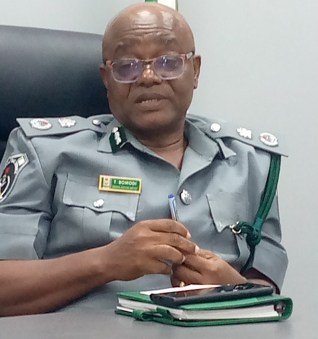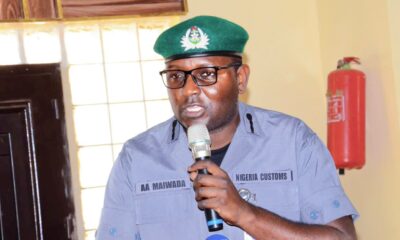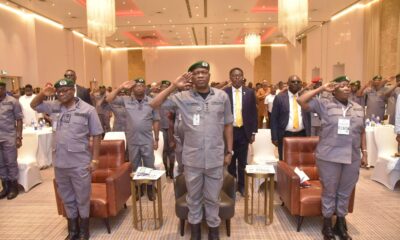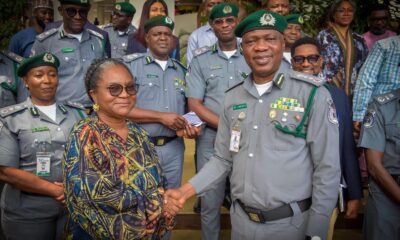Interview
‘We’ve Designed A Cross-Border Anti-Crime Scheme’ – Bomodi, Seme Customs Boss

The Seme Customs Area Controller, Comptroller Timi Bomodi says he and his management team have adopted a strategy he hopes will soon turn the tide in border community criminality and other smuggling associated vices; declaring that the strategy will be a game changer.
In an exclusive interview with the Pinnacle Time news, the cerebral customs chief disputed a recent allegation of sexual harassment by a delegation of ECWOWAS Committee against customs officers, noting that there’s no compelling evidence that his men committed the alleged offence.
He also made clarifications on allegations of military evasion of a satellite market in Badagry, and defended customs operatives against the over militarized siege of security agencies along the Badagry-Seme axis. Enjoy the conversation. Excerpt:
BY FUNMI ALUKO
Okay, let’s start with the recent claim about sexual harassment along the Seme axis that is purportedly, negatively affecting cross border business and movement. How do you react to such claim that sexual harassment by officers of the law within this axis has gotten that bad that it is already impeding trade flow? Itel5626N
I read that report and it came from a trade delegation from ECOWAS that visited here. We spent over an hour and a half at the conference room talking about different things that happen in this corridor. We talked about existing infrastructure and how it can be improved upon. We talked about processes and procedures from the custom side…what we have done what we intend to do. We talked about the laws, fiscal policies that has direct impact on trade, then we talked about gender question and how that has affected the performance of the service at the Seme-Krake joint border post. I do remember that after the lengthy discussion that we had, somebody brought up an issue of sexual harassment and I told him with all honesty, we have also heard stories in that regard where persons enroute the border have been harassed by some security operatives.
We don’t know the extent, we couldn’t verify the extent to which that harassment went but in our meetings…we always have joint security meetings here, in those meetings we gave stern warnings to all unit heads to ensure that incidents of that nature did not reoccur and that we’re creating opportunity for them to make complaints where anything of that nature happened; with the warning that any officer caught doing that would be dealt with. So that was virtually my response to the committee when they came but it was just peripheral to what they came for. Unfortunately when I now read the report of the visit of that committee, 99percent of what was discussed there was expunged in favor of that. I guess, maybe, whoever wrote that story thought it was the only thing worthy of mention and they made these headlines around it.
To me it’s unfortunate that it could do that because we discussed very, very important things that day I thought they, at least, even if you are going to mention this as part of what was discussed, without giving those other issues the same amount of prominence. So to go back to the question itself, this route is a very long one indeed, so when you talk about the corridor you’re actually referring to activities that take place from Mile 2 or let’s say from Orile down to Seme, because it’s one route. There are so many state and non-state actors on this axis, so many, we’ve had numerous complaints as of that…it shouldn’t be because we’re talking about trade facilitation. You’re talking about enhancing the user experience of traders and travelers, you can only do that when there’s a deliberate attempt to provide a safe and secure travel routes for these individuals and that is the role of state actors.
So I can’t speak for non-state actors even though they are present. There are different types of state actors on this road with different responsibilities. However apart from customs because I can speak for my officers, there doesn’t seem to be a clear-cut definition of what the responsibility of these other state actors are. I do not believe that it is normal for example to have so many police officers enforcing the law on this road. I mean…how many kilometers? Can you justify the number of check points you have? I don’t think it is justifiable and the same too for other security agencies. So where there is an overwhelming presence of these security agencies, there is an increased possibility of some of these individuals misusing their powers and in most cases, it is the weaker sex, women, that are at the receiving end. So I think to address that, it’s not just to talk from the perspective of customs because again, if you don’t have anything to declare for the purpose of customs, you’re not engaged in any illegal activity with regards to trade, then you don’t have any business with any customs personnel.
So there’s a need for all other government agencies to define their role on this axis just so that their personnel can be called to order when they are seen to be overreaching themselves, and then have an understanding that any person that is harassed in the course of their legitimate business will have a recourse to justice and that will provide an avenue for them to make any report by any of our officers that will indulge in those kind of practices. We have zero tolerance for it. We condemn it in its entirety and I assure you that incidents of that nature reported to us, we will take very drastic measures to address it.
Talking about the state actors within this corridor, I am aware that the Nigeria Customs Service is the lead agency of the security committee, something happened last Sunday where officers of the Nigerian Army were believed to have raided a satellite market around the Badagry roundabout. There are reports they carted away a truckload of rice. I want to believe that this report has reached you. The funny thing is that sources privy to the incident claimed that the army later dashed out the seized bags of rice to passersby and onlookers. As the lead security agency, are you concerned about such a development? Have you been able to call those involved to question?
I’m just hearing about this now. I can tell you that we’ve had very cordial relationships with members of the military that work here…the Navy, the Army, the Air Force, and in times past where it has been necessary, we have supported each other in achieving the primary objectives of each of these agencies. Recently we had seizures of certain items made by the Navy that were officially handed over to the Customs. The Customs will do the same thing, when we make seizures of certain items that are not the sole responsibility of the Customs, we hand over those items to the relevant agencies because they have the enabling laws and they know how to go about executing their mandate. And this is what is expected in those kind of situations.
We’ve had joint operations too, so hearing from you now that the army did make a seizure for which they dispensed is surprising. They can help us in making interventions in some of these areas, but legally, they don’t have any rights to dispense of them because once it is a seizure, it becomes the property of government and it is only government that can determine as per the the act that sets up the Nigeria Customs Service. It is only in that act that you can determine the nature of what happens to any seizure. Has it been condemned and forfeited to government? Then it is only the customs board that can determine how those goods will be dispensed with. One, But like l said, I’ve not heard about this story. I’m hearing about it for the first time. But if it is true, and I don’t think it is, but if it is true, there are clearly laid out procedures for handling matters of that nature. And it will not be rights for any agency that is not Customs to dispense or seized customs items, you know, just the way they wish. It will be illegal to do so.
At first the story was that customs overran the satellite market but upon further finding, it was clarified that it was the army. How they you feel when every unwholesome activity that goes on within your corridor is put on the doorstep of the customs, whereas the opposite is the case?
You know, we understand what our procedures are, our processes. We try to work within our mandate. We also try to carry the members of the public along when we are going about doing what we are expected to do. What we cannot do is tell people how to think. We definitely cannot tell reporters how to write their stories. But we only wish that before anybody will go about publishing anything, they would just do the basic thing, which is find out the facts. That way it becomes a lot easier for people to be given the right information. And if you are reporting something as fact, it becomes easier for even those that are reading it to verify the facts and deal with it, especially when it hints at acts of illegality. So that is just the perception.

I think around here, a lot of people understand what the challenges are. They know the amount of effort we put into enforcing rules concerning international trade. We know that there’s still a long way to go, but we are continuously improving on what we have on ground. And with the backing of critical stakeholders, and by that I mean traditional rulers around here and members of the community, we have made significant strides and we expect to do more going forward.
About this time last year, there was a report of the ocean surge affecting the NCS Barrack, up to residence of the customs area controller. What is the situation now with the rains already here?
Well, the surge is still persisting; it’s gotten really very close. And we’ve made our reports to management of the Nigerian Customs Service, and I’m sure they’ve also made their reports to the government. Because when you look at the scale of damage that can occur there, if it is not attended to in time, and the assets that will be put at risk, it’s not something that you can just ignore. I’m sure something is going to be done about it. But for now, the threat still remains. Nothing significant has been done. We hope that in this current fiscal year it will be addressed. We are optimistic about that.
A number of warehouses have emerged in Seme here to support cross-border transhipment. In spite of that, there appears to be a lull in the volume of trade and one wonders about the essence of the new warehouses if they cannot support increased organized legitimate trade, especially having regards to the general mood in the country.
We are not isolated in any way from the effects of the general economic swings. Primary among which is the exchange rate. We know that it has had a significant impact on trade. We also know that the recent reopening of the border in Niger has also taken away significant traffic from this axis to that axis, where they had always operated before the borders were closed. Again, it is the impact of policies, monetary and fiscal that is having this effect on trade. We believe that when the conditions are right, we will begin to see an up-swing in trade activities. Those that have bonded warehouses…I think we have terminals here. We don’t have bonded warehouses on this axis. We just have terminals…import-export examination terminals. They are doing the best they can. You see, the activities here are quite low, but we are doing the best we can in that regard.
Like you rightly mentioned, earlier this week, there was the reopening of the Nigeria-Niger land border in Kebbi, people have been asking when the Seme-Benin Rep land border will be opened. As the eye of the FGN here, are you privy to concrete plans about the reopening of Seme border which is on record as the biggest and busiest?
Well some of us here are also asking that question, so l really am not in the right position to know when it will be opened. I can only explain certain things. Like you just said, this corridor is the most portent economic artery in terms of trade along the Lagos-Abidjan Corridor for which Seme Customs Command plays a pivotal role. Because we believe that the government recognises the strategic significance of the Seme-Krake border post, we are also optimistic that they will accord it the recognition it deserves. And that would be to allow for the full movement of all goods that ordinarily would pass through our ports, in terms of imports. If that happens, then there would definitely be a huge impact, both on trade and the revenue-generating capacity of the command for the service. There has been in the news recently, a lot from the European Union, even AfFTA with regards to how they can leverage on this corridor to optimise the revenue-generating capacity of government and private businesses.
So, I guess everything that they are doing in terms of planning, they have factored in the infrastructure of this corridor. They factor in the customs processes and procedures. They’ve factored in the integration of both customs operations on both sides of the corridor, and even the logistics, in the sense that all of this needs to be harmonised with a view to optimising the trade potentials on this corridor to make it easier for traders to move their goods across borders, and also make it easier for governments to collect revenue and to enforce other policies that border on international trade.
Let’s look at the summary of your operational scorecard since assuming control of the command vis-a-viz your revenue target and your anti-smuggling activities.
We’ve had very significant successes in the area of revenue generation from last year until now. Wehave made over 300per cent per our expected target, and that was laudable, and this year too. Our performance last year was what I’m sure guided the increments in revenue for this year. We’re not doing too badly, even though, as I mentioned earlier, the impact of low trade has impeded our ability to collect maximum revenue for government. We are currently hovering around 80-85 per cent of expected revenue. In the area of anti-smuggling activities, we’ve made a lot of progress.
Last year, we scored very high in the area of the fight against illicit trade in endangered species. We made a lot of seizures in regards to the illicit import of prohibited drugs and narcotic substances. We made significant progress in the area of illegal import of rice, vegetable oil and other items. This is huge in monetary terms, it’s very significant. While these are good, I would like to project more on our major responsibilities, trade facilitation, import and export. There has been a major uptick in exports, goods leaving Nigeria for other neighbouring countries. We’ve created a platform that makes it a lot easier for traders to take their goods out through our borders, especially when they’ve met the requirements for exports.
Even in the execution of the agreement on ECOWAS, the ECOWAS Liberalisation Scheme for originating goods in West Africa, we’ve also made it a lot easier to allow for the movement of these goods once they have been identified as originating goods. Ultimately, my vision is to make the borders more user-friendly. People should not feel intimidated coming to the borders to do their legitimate business. We encourage them to approach the borders with confidence and to understand that the officers that are here are here to only assist them and make it easier for them to do their businesses. At the same time, we send out a clear warning to individuals whose intention is to carry out illegal businesses. We’ve made a lot of seizures in that regard and prosecuted a lot of people. Even currently, we have in our cell a notorious smuggler that has made life miserable for officers for a long time here. That person will be sent to court. Hopefully, he’ll be giving a very stiff punishment that will deter other people from following the same route.
You have been area controller here since September 2023, what palpitates your heart, draws you near the community people. Do you feel some kind of affinity with them, something you sincerely wish for them, a sort of positive turning point?
Sure, we talk about enforcing the policies of government…a lot of the time, people think of enforcement in terms of carrying a gun, pursuing a smuggler, blah, blah, blah. Yes, there are two things, that is my thinking and I think to a great extent, the management of which the current CG is at the very top and supports that thinking. We can react to our environment or we can be proactive. And we have adopted the proactive approach here. If you look at the terrain across our borders, you’ll find something that is present…it stares everyone in the face and it is the lack of infrastructure, the lack of opportunities for border residents. So when you consider that most of these border community dwellers don’t have access to opportunities, but they are given the option of leveraging on their very presence at the borders, they will usually seize upon it. These are people that are just trying to make a living for themselves.
So we looked at it from the proactive angle and we say, how do we provide opportunities for these people that will lure them away from the border line crimes? And the option of creating a skills acquisition center came up. So right now in Seme Command, we are building a skills acquisition center. And what that center is going to do is to empower border community dwellers on both sides of the border, both here in Seme and in Cotonuoe, those ones that are staying close to us. We believe that when these individuals have been provided the necessary training, they’ve acquired the necessary skills, they can on their own begin to create opportunities for themselves. I can tell you that most of these people that lend themselves as mules to people that carry things across the borders probably don’t earn more than N2,000, maximum N3,000 in a day. But if you learn a trade and you are good at that trade, your earning potential increases geometrically. In fact there’s no limit to what you can earn.
And with that kind of opportunity, it will be very difficult for anybody to lure them to do something for which they have a low potential for earning, and which can put them into trouble. They can be arrested; they can suffer for indulging in those practices. So that is the approach that we want to adopt, we believe that if we can attract up to five percent of the border community population, and the others sees how fast these people can rise up in society in terms of utilizing their skills, it will lure more people to learn and it will take them away from smuggling. And that will be a game changer because over time, we will be able to provide an economy within these communities that is self sustaining, that can transform the lives of fellow community dwellers, take away the badge of criminality from such communities and return them to the path of respect; and make the border community a lot safer for everyone.
That is the strategy we are adopting and hopefully by the time it comes to fruition, we will see the transformative effects, and this could be the pilot. If it is successful here it could be replicated in other places.


































